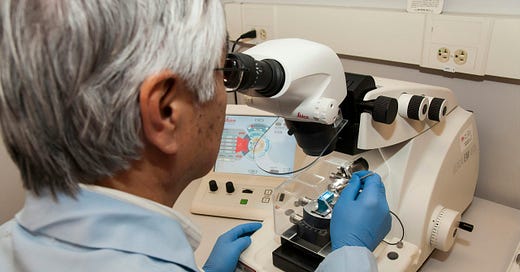The Future of Humanity: What If We Could Edit Our DNA for Perfection?
The concept of editing our DNA, our very genetic blueprint, has shifted from the realm of science fiction to a plausible reality.
The concept of editing our DNA, our very genetic blueprint, has shifted from the realm of science fiction to a plausible reality.
What if we could wield the power to shape our genetic destiny, editing out imperfections and ushering in an era of unprecedented human potential?
The Genomic Revolution: Unravelling the Code
At the heart of this transformative idea lies the revolutionary field of gene editing.
CRISPR-Cas9, a groundbreaking technology, has become the scalpel of geneticists, allowing precise modifications to the DNA sequence, and this tool, akin to a molecular cut-and-paste system, has sparked a flurry of possibilities and ethical debates.

1. Eliminating Genetic Diseases
The prospect of editing out genetic diseases is one of the most compelling promises of gene editing technology.
Researchers are exploring ways to correct or eliminate faulty genes responsible for conditions such as cystic fibrosis, Huntington’s disease, and sickle cell anaemia, while trials are already underway, showcasing the potential to alleviate human suffering on a genetic level.
2. Enhancing Cognitive Abilities
Beyond eradicating diseases, the prospect of enhancing cognitive abilities has fuelled both excitement and apprehension.
Could we edit genes associated with intelligence and memory to elevate the cognitive prowess of future generations? The scientific community treads cautiously, navigating ethical considerations and potential unintended consequences.
3. Extending Human Lifespan
The age-old quest for immortality may find an unexpected ally in gene editing.
Scientists are exploring genetic modifications linked to the ageing process, with the aim of extending human lifespan, and while the fountain of eternal youth remains elusive, the idea of editing our DNA for longevity poses both tantalizing possibilities and profound ethical dilemmas.
Navigating Ethical Crossroads
As we stand on the precipice of this genetic frontier, ethical considerations loom large.
The power to edit our DNA raises questions of designer babies, socio-economic disparities, and unintended consequences. How do we navigate the fine line between eradicating genetic diseases and venturing into the concept of genetic enhancement?
What If…
What if we could sculpt the future of humanity with the precision of a master craftsman?
The prospect of editing our DNA for potential perfection is both thrilling and daunting, and it beckons us to consider not just the scientific marvels but the profound responsibilities that come with playing genetic architects. In the spirit of exploration and discovery, the future of humanity unfolds in the delicate dance between scientific advancement and ethical introspection.
The power to edit our DNA invites us to think not only what we can do but what we should do, steering us toward a future where the pursuit of perfection is tempered by the wisdom to wield this extraordinary power responsibly.
As we navigate this controversial path, the question lingers:
What if the future of humanity is shaped not just by our ability to edit genes but by the collective wisdom to edit them with purpose, compassion, and a profound respect for the intricate essence of life itself?
Cong, L., Ran, F. A., Cox, D., Lin, S., Barretto, R., Habib, N., … & Zhang, F. (2013). Multiplex genome engineering using CRISPR/Cas systems. Science, 339(6121), 819–823.
Plomin, R., & von Stumm, S. (2018). The new genetics of intelligence. Nature Reviews Genetics, 19(3), 148–159.
López-Otín, C., Blasco, M. A., Partridge, L., Serrano, M., & Kroemer, G. (2013). The hallmarks of aging. Cell, 153(6), 1194–1217.




